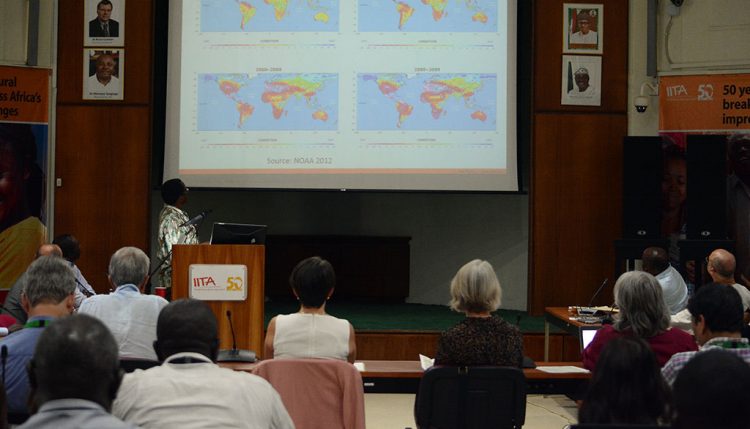
Tackling emerging pest and disease threats – David Chikoye
The IITA plant health team is addressing a plethora of pests and diseases in Africa as part of efforts to increase agricultural production. David Chikoye, Director for Southern Africa and head of the plant health team, talked about the various activities of the team during the R4D Week session on plant health. These include pests of cassava, soybean, banana, maize, and cowpea.
He said plant health was becoming more important than ever before in sub-Saharan Africa where predictions by the National Oceanic and Atmospheric Administration (NOAA) show droughts will be more frequent. This will have a negative impact on yield gaps which are already high.
On emerging new pests, the team is tackling the fall armyworm. “As at 2016 the pest was in 41 countries. To control this disease, we need to go back to countries where the pest has been to look for lessons. We also need active surveillance to track its spread. We are also looking at integrated control options including the use of pesticides, biological, cultural, and mechanical control methods, and host plant resistance,” Chikoye said.
Chikoye also reported on progress in controlling the banana panama disease. This deadly soil-borne disease has eliminated the Gros Michel banana and is on the move. Many countries are at high risk based on their proximity to countries where the disease is.
The main challenge in controlling this disease is a lack of resources. Together with Bioversity International, CGIAR Research Program on Roots, Tubers and Bananas (RTB), FAO, and other partners, IITA had held a lot of meetings on strategies to address the disease.
“We are also strong on surveillance, reporting any new cases, raising awareness on the impact of the disease, and building capacity on rapid diagnostics. We have set up a response strategy and containment plan for countries around Mozambique where the disease has been reported in Africa,” he said.
Under agronomy he said the team was addressing issues such as weed management. Weeding is a major challenge as it is mostly done by women and children and takes 50–80% of the total labor budget. “While use of herbicides is increasing, its application is not well done—farmers are not protecting themselves and land preparation is poor. We are looking at three components of cassava integrated weed management: mechanical weeding, use of herbicides, and good agronomy. We have had excellent results; we’ve seen herbicides being effective for 9 weeks with good land preparation,” he said.

